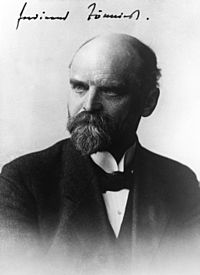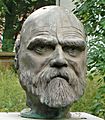Ferdinand Tönnies facts for kids
Quick facts for kids
Ferdinand Tönnies
|
|
|---|---|

Tönnies, c.1915
|
|
| Born | 26 July 1855 in Oldenswort, Schleswig, Denmark
|
| Died | 9 April 1936 (aged 80) |
| Nationality | Germany |
| Alma mater | University of Jena University of Bonn University of Leipzig University of Berlin University of Tübingen |
| Known for | Sociological Theory; distinction between two types of social groups, Gemeinschaft and Gesellschaft |
| Scientific career | |
| Fields | Sociology |
| Institutions | University of Kiel |
| Influenced |
Otto Neurath< Michael Oakeshott |
Ferdinand Tönnies (born July 26, 1855 – died April 9, 1936) was an important German sociologist, economist, and philosopher. He is famous for his ideas about different types of social groups. He helped create the German Society for Sociology and was its president for many years.
Tönnies, along with Max Weber and Georg Simmel, is seen as one of the main founders of German sociology. He wrote over 900 works on many topics in sociology and philosophy.
Contents
Biography
Early Life
Ferdinand Tönnies was born on July 26, 1855. His family were wealthy farmers in a region called North Frisia, Schleswig. At that time, this area was part of Denmark. Tönnies was special because he was the only sociologist of his time who grew up in the countryside.
His father, August Ferdinand Tönnies, was a successful farmer. His mother, Ida Frederica, came from a family of church ministers. Ferdinand was the third of their seven children. When he was nine years old, his family moved to Husum, a town on the North Sea coast.
Education and Academic Career
Ferdinand Tönnies started university in 1872. He studied at several universities, including Jena, Bonn, Leipzig, Berlin, and Tübingen. In 1877, at age 22, he earned his doctorate degree from the University of Tübingen. His main interests soon shifted to political ideas and social issues.
After more studies in Berlin, he went to London to research the ideas of Thomas Hobbes, an English thinker. Tönnies became a lecturer at the University of Kiel in 1881. However, he only held this job for three years. The government thought he supported social democrat ideas because he showed sympathy for a workers' strike in Hamburg in 1896. Because of this, he didn't become a full professor until 1913.
He returned to Kiel in 1921 as a professor. He taught sociology until 1933. At that time, the Nazis took away his job. This happened because he had criticized them in his writings and supported the Social Democratic Party of Germany. Tönnies stayed in Kiel and passed away three years later in 1936.
Sociological Contributions
Ferdinand Tönnies wrote many important books about how society works. His most famous work is Gemeinschaft und Gesellschaft (1887). This book explains his ideas about different kinds of social groups.
He also studied how society changes, especially focusing on public opinion, customs, and technology. Tönnies was very interested in how to study society using statistics. He even created his own method for statistical research.
After publishing Gemeinschaft und Gesellschaft, Tönnies continued to explore social life. He looked at things like morals, traditions (folkways), and public opinion. His later works often used the same main ideas from his famous book to understand these different parts of society.
Views on Family
Tönnies believed that strong family life was very important for society. In 1893, he wrote that modern society was suffering because family life was breaking down. He thought that improving and extending family life was a key way to bring back a sense of community.
He felt that modern capitalism, with its low pay and long working hours, was harming families. Tönnies suggested two main ways to help families:
- Family Groups: Families who were related could form groups. They would keep family records, write to each other, gather for festivals, and help each other by sharing resources. They could even set up a family fund to help those in need.
- Community Groups: Unrelated families could also join together. These groups would focus on living a simpler, healthier life. They would aim for better social interaction and understanding. A few families might even live together, buy things together, and share products. These groups could then join with others to gain more economic and moral strength.
Key Moments in His Life
- 1855: Born on July 26 in Oldenswort, Schleswig.
- 1864: His family moved to Husum.
- 1870: Met the poet Theodor Storm, who became a lifelong influence.
- 1871-1877: Studied at various universities and earned his doctorate.
- 1878: First visit to England to study the works of Thomas Hobbes.
- 1881: Submitted an early version of Gemeinschaft und Gesellschaft for his academic qualification.
- 1887: The first edition of Gemeinschaft und Gesellschaft was published.
- 1890: Became a lecturer at the University of Kiel.
- 1892: Helped start the Society for Ethical Culture.
- 1894: Married Marie Sieck and had five children.
- 1896: Supported the Hamburg dock strike, which caused problems for his career.
- 1909: Co-founded the German Society for Sociology and became its president.
- 1913: Became a full professor at the University of Kiel.
- 1922: Published Kritik der öffentlichen Meinung (Critique of Public Opinion).
- 1932: Joined the Social Democratic Party to oppose the rise of fascism.
- 1933: Was removed from his professorship by the Nazis.
- 1936: Passed away.
Gemeinschaft and Gesellschaft
Tönnies is best known for explaining two main types of social groups: Gemeinschaft and Gesellschaft.
- Gemeinschaft (pronounced Guh-MINE-shaft) means community. These groups are based on strong feelings of togetherness and shared bonds. People in a Gemeinschaft feel connected, like a family or a close neighborhood. Their relationships are often personal and based on tradition or shared beliefs. Rules in a Gemeinschaft are usually unwritten, like customs or morals. Examples include traditional villages or close-knit religious groups.
- Gesellschaft (pronounced Guh-ZELL-shaft) means society. These groups are formed for specific goals or purposes. People in a Gesellschaft interact more formally, often for their own benefit. Relationships are usually less personal, like those in a large city or a business company. Rules in a Gesellschaft are often written laws, and order is kept by police and courts. Examples include large corporations or modern nations.
Tönnies believed that in a Gemeinschaft, people act based on an "essential will." This means they naturally want to serve the group's goals, often without even thinking about it. In a Gesellschaft, people act based on an "arbitrary will." This means they use the group to achieve their own individual goals.
He saw Gemeinschaft as being like a family or a neighborhood in an older, rural society. Gesellschaft was more like a large company or a modern state, especially in the urban, capitalist world he lived in. In Gesellschaft, relationships can become more about self-interest and money.
Criticisms
Some people have criticized Tönnies' ideas about Gemeinschaft and Gesellschaft. They say that his ideas might make it seem like all societies follow the same path from traditional to modern. However, Tönnies himself never actually said that all societies must evolve in exactly the same way.
Published Works (Selection)
- 1887: Gemeinschaft und Gesellschaft (Community and Society). This is his most famous work.
- 1896: Hobbes. Leben und Lehre (Hobbes. Life and Teachings). A study of the philosopher Thomas Hobbes.
- 1909: Die Sitte (Custom).
- 1922: Kritik der öffentlichen Meinung (Critique of Public Opinion).
- 1931: Einführung in die Soziologie (Introduction to Sociology).
Images for kids
See also
 In Spanish: Ferdinand Tönnies para niños
In Spanish: Ferdinand Tönnies para niños
- Ferdinand-Tönnies-Gesellschaft (Ferdinand Tönnies Society)
- Voluntarism (metaphysics)
- Hamburg dockers strike 1896/97 [German]
- Gemeinschaft and Gesellschaft
- Max Weber
 | Delilah Pierce |
 | Gordon Parks |
 | Augusta Savage |
 | Charles Ethan Porter |


